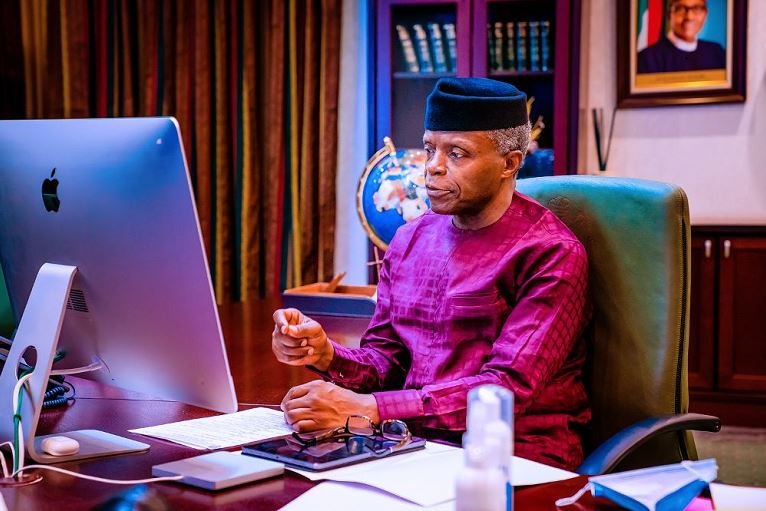*Projects in progress include Apapa-Oshodi-Oworonshoki-Ojota in Lagos; Obajana-Kabba in Kogi; & Bodo-Bonny Road and Bridges across Opobo Channel in Rivers
Vice President Yemi Osinbajo says by adopting Public Private Partnership’s (PPP) cost-effective measures, the Buhari administration is now delivering 19 road projects across the six geo-political zones in the country totaling 780.15 km.
The road projects being undertaken by private companies and now advancing to completion include:
a.The reconstruction of Apapa-Oshodi-Oworonshoki-Ojota Road in Lagos State (34 km) by Dangote Industries Limited.
b.The reconstruction of Obajana-Kabba Road in Kogi State (43km) by Dangote Industries Limited.
c.The construction of Bodo-Bonny Road and Bridges across Opobo Channel in Rivers State (38km) by the Nigerian Liquefied Natural Gas Limited.
The Vice President disclosed this on Tuesday at a webinar on Public-Private Partnerships, organized by the Law firm of Yusuf O. Ali & Co in collaboration with the Business Law Department of the Faculty of Law, University of Ilorin.
According to Prof. Osinbajo, “In 2017, we introduced the Road Trust Fund (RTF). The fund is a tax credit scheme to incentivize private sector participation in the development of federal road infrastructure. The relief is enjoyed by a deduction of 50% of the amount spent on the project from the income tax that would have been payable by the company.”
The VP also referred to the Executive Order No. 007 of 2019, the Companies Income Tax (Road Infrastructure Development and Refurbishment Investment Tax Credit Scheme).
“The objective of the Scheme is to accelerate public road infrastructure development by incentivizing private sector entities to construct and refurbish eligible roads across the country in exchange for tax credits, which could then be applied against company income tax payable,” he stated.
Continuing, the Vice President disclosed that “nineteen roads have been approved so far by Mr. President under the Scheme, totaling, 780.15 km. These roads, in eleven (11) States across the six geo-political zones, are being executed by six (6) private sector players in the manufacturing and construction industries.”
Emphasizing the importance of PPPs in funding critical infrastructure projects, the Vice President said “there can hardly be a better time to explore the use of PPPs especially in the delivery of public infrastructure.”
His words: “First, public revenue both for States and the Federal government have fallen precipitously in the wake of the disruptions of the COVID 19 pandemic.
“For the Federal Government, barely 30% of the budget is available for capital expenditure, besides a national infrastructure deficit. So, clearly there is a need to bring in the considerably larger size of private capital to participate in public infrastructure projects.”
Further justifying the need for strong PPP initiatives, Prof. Osinbajo said “Dangote’s Lekki project comprising a refinery, fertilizer factory, and a subsea pipeline is estimated to cost USD15 billion. (About N6 trillion almost half of the entire federal budget of N13 trillion).”
He added that access to capital from international commercial lenders is cheaper for private companies with a good reputation.
Besides access to cheaper capital, the Vice President said “private sector partnership with the public sector also brings in the discipline of execution and expenditure which is often missing in government projects.”
“Even with PPPs, you will sometimes find that the inefficiencies and bureaucracy of the public sector hold down the execution. So, here you find that the PPP is an attempt to bring in private sector credit into execution of contracts and I think this is helpful because it helps discipline the public sector implementation process which is usually bucked down by bureaucracy.
“These factors have largely informed our government’s clear preference for PPPs. We have also sought to create a conducive policy and legal environment for PPPs to thrive,” the Vice President explained.
Prof. Osinbajo however advised that “in thinking through the PPP framework, we must also think through some of its challenges, especially in PPP’s where the private partner’s compensation is from user-based payments such as tolls on roads, or charges or fees in an airport concession, for example.”
Citing an example with the Lekki-Epe road concessioning, the Vice President said “it was perhaps one of the best models that you could find. A number of foreign banks and infrastructure companies were involved in it.”











